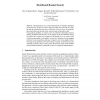Free Online Productivity Tools
i2Speak
i2Symbol
i2OCR
iTex2Img
iWeb2Print
iWeb2Shot
i2Type
iPdf2Split
iPdf2Merge
i2Bopomofo
i2Arabic
i2Style
i2Image
i2PDF
iLatex2Rtf
Sci2ools
110
click to vote
HIPC
2007
Springer
2007
Springer
Distributed Ranked Search
P2P deployments are a natural infrastructure for building distributed search networks. Proposed systems support locating and retrieving all results, but lack the information necessary to rank them. Users, however, are primarily interested in the most relevant results, not necessarily all possible results. Using random sampling, we extend a class of well-known information retrieval ranking algorithms such that they can be applied in this decentralized setting. We analyze the overhead of our approach, and quantify how our system scales with increasing number of documents, system size, document to node mapping (uniform versus non-uniform), and types of queries (rare versus popular terms). Our analysis and simulations show that a) these extensions are efficient, and scale with little overhead to large systems, and b) the accuracy of the results obtained using distributed ranking is comparable to that of a centralized implementation.
Distributed And Parallel Computing | HIPC 2007 | P2P Deployments | Retrieval Ranking Algorithms | Versus Popular Terms |
Related Content
| Added | 07 Jun 2010 |
| Updated | 07 Jun 2010 |
| Type | Conference |
| Year | 2007 |
| Where | HIPC |
| Authors | Vijay Gopalakrishnan, Ruggero Morselli, Bobby Bhattacharjee, Peter J. Keleher, Aravind Srinivasan |
Comments (0)

